| "Mug-up Mangamma" - A light hearted short Tamil film on the influence of films and television on school-going children made by our Eastside Story Children teams from Chennai and Krishnagiri has been selected by the jury of the Children's Film Society of India's Golden Jubilee Film Festival, Delhi. The film festival is from 14th to 18th November 2006. Mug-Mangamma would be screened at 12 pm on the 18th at Siri Fort , Auditorium III, Delhi. We sincerely thank the organisers, UNICEF and all our supporters. Please click on the video to view the film. Sincerely, Sriram Ayer | |
NalandaWay was started with a staunch belief in art as a healing and learning medium. Through dance, music, visual arts, theater and films we work with children to find their voice, express through art and think for themselves. Our interventions have helped the kids to develop self confidence to be masters of their lives. Follow our chronicles and be a part of this amazing journey.
Thursday, November 09, 2006
Eastside Story Film selected for CFSI Golden Jubilee Film Festival
Wednesday, November 01, 2006
Monday, September 04, 2006
"Kalvettu" film is helping drop-out children return to school

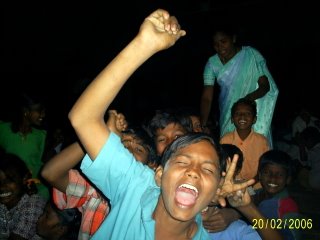
"Kalvettu" - a six minute short film researched, scripted and performed by our Eastside Story children team in Krishnagiri is changing lives of children. Please read the article below by Ms. Sumitra Thangavelu, a Chennai based writer.
Click here to view the film
http://www.youtube.com/watch?v=aLbRjYq4bQ8
Click here to view the photo gallery of the screenings
http://picasaweb.google.com/nalandaway/KalvettuScreening
Duraiyeri village, Krishnagiri district: Till a year ago, Saraswathi, aged 13, was caught in the routine of household chores. She would wakeup early and help her mother wash utensils, sweep and clean the house, fetch water, and cook. She is in school today simply because her mother, Kanamma, watched a film called Kalvettu.
Kalvettu is the true story of Prithviraj, a boy who was severely abused by his alcoholic father. His father used to tie both his hands with a rope and drop him inside a well - a method to blackmail his wife for some money. Prithviraj's mother always gave in, just to save her child.
"When I saw the film, I was deeply touched. That boy had to give up his studies because of his father. I realized that my daughter needed an education to face the world boldly. I enrolled her in school,'' says Kanamma, sitting outside her home in the picturesque Duraiyeri village in Krishnagiri's Thali Block.
Saraswathi dreaded going to school as her teacher often scolded her for not doing too well in studies. She was a slow learner but without a supportive learning environment, was unable to make an effort to do better. She cried often and soon, her mother decided to keep her at home.
She would probably have been married off sooner than later if her mother had decided against sending her to school. Today, Saraswathi is learning to read and write at the National Child Labour Project (NCLP) school in her village. NCLP in Krishnagiri is being implemented by the state government, UNICEF and other NGOs to enroll child labourers and out-of-school children in schools.
Krishnagiri is among the 16 districts in India where UNICEF is implementing integrated village planning projects to establish various child-friendly initiatives. Kalvettu was screened in select villages in the district to gauge people's reactions to problems facing women and children, and to draw awareness to the problems that exist in societies.
Kalvettu was also among the films screened during the launch of Eastside Story, an initiative by social organization NalandaWay and UNICEF to educate children in all aspects of film-making. It is a network of news bureaus that aims to give children aged 12 to 18 years the skills to make films, write news articles and do radio shows so they can bring in their perspective to an issue. Kalvettu was made by children themselves.
Thanks to the efforts, Saraswathi today is gaining an education. Standing against a wall of her home, she nods earnestly when asked if she wants to study more. Being shy by nature, it's difficult to make her talk but she smiles when asked if she likes school. What she does manage to say is a "yes'' when asked if her teachers are nice to her.
Saraswathi may be a slow learner, but with supportive people around herein school, she now has an opportunity to study and gain in knowledge and confidence. She is testimony to the power of sustained efforts to create awareness about child rights in villages.
- Sumitra Thangavelu
Thursday, August 17, 2006
Over 60,000 Children participate in a referendum
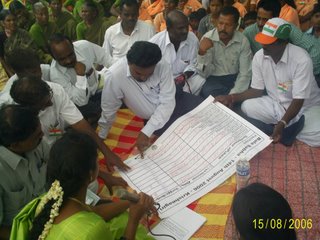
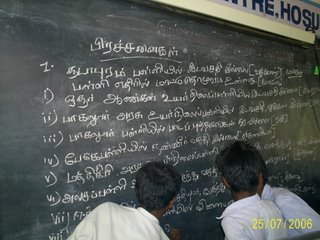
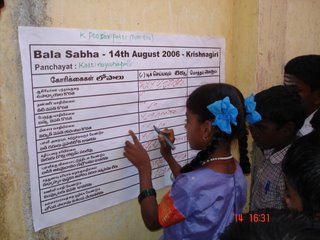
14th of August was an important day for people who believe that children can change the world. Over 60 thousand children from 337 Panchayats of Krishnagiri District participated to voice their opinion about their issues.
A one-of-a kind initiative in the country saw hundreds of children in the ages 8 to 16 vote for issues that are dear to them.
Children representatives from 337 panchayats joined together in July to identify their top ten issues. These issues were made into a poster. On 14th August each child marked three important issues on the poster.
The poster was presented at the Grama Sabha that was held on Independence day. Grama Sabha is held 3 times in all Panchayats (Jan 26, Aug 15, and Oct 2) every year in Tamil Nadu. The problems of the Panchayat and the achievements are discussed between the elected representatives, district administration and the common public.
This event was organised by the District Administration and the Content, Training and methodology was provided by NalandaWay. The programme was assisted by UNICEF.
This year the Grama Sabha was conducted with more participation from the village community. It was extremely heartening to find that the issues discussed were based on the Bala Sabha Issue Poster finding submitted by the children representatives.
Bala Sabha was reviewed in the following newspapers.
Click on the link to view the article.
The Hindu – 15th August 2006
http://www.nalandaway.org/pdf/Hindu-150806.pdf
Dina Thandhi – 15th August 2006
http://www.nalandaway.org/pdf/DT-150806.pdf
Please click on the following link to view the photographs of the training and the event.
Gallery: Bala Sabha in Krishnagiri Dist. TN
http://photos.yahoo.com/nalandaway_photos
Comments are welcome.
Saturday, August 12, 2006
Eastside Story LAUNCHED
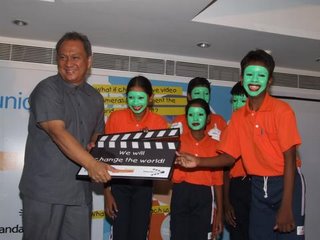

"Eastside Story" was launched to the media, corporates and oganisations on Friday, 21st July 2006 at Chennai.
The event was presided by Mr. Cecilio Adorna, Country Representative, UNICEF and Mr. N. Ram, Editor-in-Chief, The Hindu.
The event was a great success and I would like to thank specially Mr. Thomas George, Officer-in-Charge, UNICEF for making it possible.
The programme was well covered by the print and electronic media.
You could read the press articles by clicking on the links below;
1. The Hindu - http://www.nalandaway.org/pdf/hindu.pdf
2. The New Indian Express - http://www.nalandaway.org/pdf/Indian-Express.pdf
3. Deccan Chronicle - http://www.nalandaway.org/pdf/Deccan-Chronicle.pdf
4. Dinamalar - Tamil - http://www.nalandaway.org/pdf/Dinamalar.pdf
The photographs of the event can be viewed by clicking the following link;
http://photos.yahoo.com/nalandaway_photos
Gallery: Eastside Story launch
Sincerely,
Sriram V. Ayer
Wednesday, May 31, 2006
Corporate vs NGO
My point was that corporates in India wield a lot of power today and the right people at the right levels can make a big difference. Infact if there is someone who can make a bigger difference than even corporates then it is the government, since they have not just the funds but also the administrative mechanisms in place to improve living conditions of people. But that apart, corporates today wield enormous power in terms of the funds they have and the say they have.
I have seen two ways in which they can make a difference. One, in terms of business strategy. Granted ITC’s e-choupal gave the company easier access to cheaper grains. But it has benefited entire communities where middlemen no longer rule the roost with exclusive information on demand-supply. Similarly ICICI’s big leap into rural banking would probably be able to help smoothen the finance system, which even today continues to be a nemesis for most people.
The other way in which I see corporates helping are in terms of setting aside money and time for community initiatives. The most obvious examples are of course the Tatas who actually put people in charge of setting up relief centers and schools and usually don’t seem to be giving money to a NGO and sitting quiet.
Of course what a lot of corporates usually do is to give money to NGOs and ask them to manage the show. This is good too but it means NGOs need to have well qualified people working in them to ensure that the money is well used.
Which brings me to the question my friend and me were arguing about – Can MBAs of our generation make a difference to people’s lives by staying in corporate life or are their skills needed more in NGOs.
I would be interested in hearing answers to that.
Saturday, May 27, 2006
Eastside Story Films ONLINE
I have attached the links for two of the short films made by our children teams.
1. Kalvettu - 6.11 min
http://www.youtube.com/watch?v=aLbRjYq4bQ8
2. Mezhuguvarthee - 2.50 min
http://www.youtube.com/watch?v=Abv395ST_SE
The language is Tamil with English subtitles.
These films were researched, scripted and performed by children with the guidance of professionals.
You would need a good broadband connection (min 200kbps) for uninterrupted playback.
Looking forward to your feedback.
Love
Sriram
Tuesday, May 09, 2006
Toilets vs costume malfunction
What I was reading really shook me.
Here are the excerpts
"...Studies have documented how women choose to eat less and specific times to avoid having to go to the toilet during daylight hours. In the absence of toilets, they have to use fields and this they can do after dark or early in the morning. As a result, they are forced to control their intake of food resulting in many forms of under-nutrition andanaemia."
"For young girls, the problem is even more acute, particularly after they cross puberty. Women and young girls also limit the amount of water they drink for the same reasons".
The article starts with an observation on Gujarat; hence I assumed that this problem is only in the remote and tribal areas of West India. I brought up this topic for discussion with our Eastside Story Girls' team and to my utter surprise one of the girl remarked...."Sir, we are very familiar with this. Not that we can't afford the food, our fathers do definitely earn that much. But there is no safe and decent toilet in our school. So we don't drink water and eat very little".
I was quite taken aback. I brought up this issue to the head of the district's public health programme and he behaved as if all this was news to him. May be he never knew about this.
Well... our papers are busy having page 3 in all pages and news channels are busy discussing 'costume-malfunction' on prime time. More the justification for "Eastside Story" and the need to hear from children.
Sriram V Ayer
Tuesday, April 04, 2006
Meena
Thursday, March 02, 2006
"Aren't you men ashamed of yourselves!"

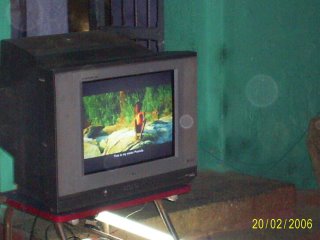
Could children help a community raise crucial questions?
Does hearing community's problems from children raise the sensitivityand expedite the response by Government and NGOs?
May be true!
Eastside Story a joint initiative between NalandaWay and UNICEF is aproof to this debate. Eastside Story project is establishing a network of Children Media Teams in villages and slums to help mainstream media, policy makers, NGOs and Government take notice of problems as perceived by children.
Recently the first all girls team from Krishnagiri in Tamil Nadu state, have produced a short film titled "Kalvettu". This film is creating waves in the district. The film is being screened at 4 to 5 villages everyday with the help of Government and local NGOs. This film addresses domestic violence, children abuse, alcoholism and a child's perception of this problem.
The film is a true life story of a little boy and his family. The story was mentioned in an earlier mail of mine to this group. http://groups.google.co.in/group/nalandaway/browse_thread/thread/1a2cf3f2cca185cb
"Aren't you men ashamed of yourselves!". This was a comment made bya middle aged visibly angry woman when the film was screened in Varattanapalli village. This village has very high incidence of alcoholism and child labour.
Children are asking questions! And women who are the major victims ofany community issue are using this as arsenal in the fight for justice and equality.
Men beware!
Photos of the screening at Varattanapalli village can be viewed here http://photos.yahoo.com/nalandaway_photos
Gallery: Kalvettu screening
So long,
Sriram
Friday, February 24, 2006
Meena
The last weekend however we got down to business. I had mentioned earlier that Meena's English text books speak a language that is far above her current vocabulary. But now having decided to prepare with a focus entirely on the exam, we started working on her guide books. Meena has a good memory and can reel off answers. The problem was to connect the correct answers to the questions. So I made her translate each individual word in her questions into Tamil and then see if she could make some sense. In a little while she was actually understanding the questions. And I felt really proud. Becuase three months ago she would not have been able to figure out what words like 'what' 'is' 'for' and 'then' meant. But now her basics had brought her to a level where she could roughly make out what was being asked. Finally all the effort she and I had put in was begining to show (Ok- I am unabashedly taking credit too. But believe me when you have never done this before it is a wonderful feeling to know that you have made a slight difference). When I embarked on this exercise of teaching her English, I did not know where this was leading us both. But seeing proof of it has given both of us a much needed boost.
Next week of course we are planning to tackle her Science and Social studies text books. They are both in Tamil and I am probably going to be of little use to her since her Tamil is of a much higher standard than mine. But somehow both us have just got that little bit of faith that there is some difference both of us can make together.